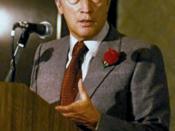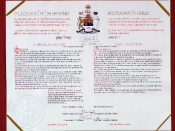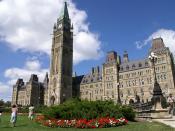Pierre Trudeau's death on September 28, 2000, brought about a spontaneous outpouring of national pride and mourning perhaps unprecedented for any political leader in our history. To many Canadians, he was the very embodiment of the nation. Yet, by what means can we judge a life? In a recent book two historians ranked Pierre Trudeau a paltry fifth among Canada's prime ministers. If criteria for eminence were to include vision, force of character, style or intellect, then surely none but Macdonald would surpass Trudeau. He would be considered truly the second father of his country.
There is a powerful irony in the nationalistic outpouring that followed Trudeau's death. He hated nationalism of all kinds and French-Canadian nationalism in particular. The whole idea of the nation state, he once wrote, "managed to cripple the advance of civilization." He argued throughout his life that nationalism was fundamentally racist and a threat to individual freedoms.
This view was formed in Maurice Duplessis's Québec and hardened with the efflorescence of Québec nationalism during the Quiet Revolution of the 1960s. His views were comforting to English Canadians threatened by the stirrings in Québec, but they increasingly alienated Québeckers. Hence the headline in La Presse on Trudeau's death, "The Hero of English Canada."
Pierre Trudeau was more than that. For many Canadians he was the best in us. Fluently bilingual, of mixed parentage, he had charisma and style. In an era of politics starved of imagination and vision, Trudeau's ability to inspire passion is a poignant memory.
From the very beginning Trudeau did not sound like other politicians. On February 28, 1968, when he announced his candidacy for the Liberal leadership, he quipped "To be quite frank, if I try to analyze it, well, I think in the subconscious mind of the press it started...


